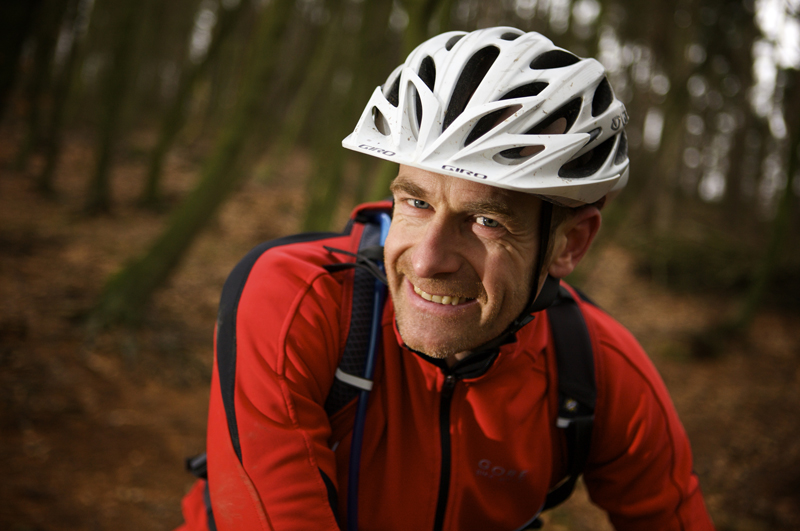It’s hard to keep track of what different categories mean these days, but Merida’s flagship mid-travel 650b bike is a solid multi-purpose trail machine with the emphasis on consistently high quality stop-and-go equipment rather than true all-mountain radical riding control and charisma.
Frame and equipment: niggles weaken all-mountain credentials
If you’re looking for a bike that comes under the old definition of all-mountain, where bigger 150-170mm travel, bit-of-climbing-but-a-lot-of-downhill beasts used to roam, then the One-Forty family is under-gunned for your needs. Despite the All-Mountain slogan on the triangular sloped and curved top tube the One-Forty B is more trail bike, with hardcore duties being handled by the excellent 160mm travel One-Sixty range.
The Fox TALAS travel adjust fork is actually 150mm at full stretch (down to 120mm at the flick of the fork top lever), but the 32mm legs with the extended dropout tips to make it 650b-compatible put its flex and twang behaviour into the cross-country end of 'trail' rather than the downhill end.
While the stem is an aggressively contemporary 60mm and the head tube sits at a suitably slack 67-degree angle, the 730mm FSA Afterburner bars offer adequate, rather than truly advantageous, leverage.

Fox 32 fork stretched to 150mm is light but twangy
There are other details that niggle on a basically sorted frame. The front mech is a direct mount setup and the gear cables and dropper post hose are fed internally through the frame (at an awkwardly acute angle at the front end) but the bottom bracket’s an old-school threaded cup, skinny axle type. There are no chainguide mounts on the frame either, further undermining the One-Forty's all-mountain credentials, though you can clamp a plate mount chainguide behind the bottom bracket cup.
There’s also not much room for mud between the large volume tread and wheel hugging Y front section that triangulates the stout tubed rear subframe.

Sun Ringle wheels give easy tubeless compatibility thanks to the licenced Stan’s rims
Otherwise, the kit is mostly positive. The Merida’s stop and go componentry will score with high mileage fans as XT is pretty much the gold standard for going the distance whatever the weather or lack of maintenance. XT brakes are excellent for power and modulation, helping keep you upright when the front end starts to lose the plot in the steeps.
Sun Ringle Charger Expert hoops are comparatively light but broad enough to shoulder their massive Schwalbe Nobby Nic rubber and the Stan’s No Tubes licensed rim profile makes them easy to blow up tubeless to increase their impressive floatation performance. The PaceStar triple compound rubber mix rolls pretty easily too, once you’ve got the Merida’s mass moving.
Ride and handling: neither one thing, nor the other
The smooth fork and pliable rear suspension add to the easy-rolling trail isolation and easy progress, and 650b adds a palpable traction and speed sustain edge on rougher trails compared with 26in wheels. The 1-B handles decent sized drops and big rocks well enough, as long as you make use of the short-stroke Reverb dropper post to get back and shift the impact control emphasis to the solidly built rear end.
The front end, it must be said, feels, underpowered when pushing hard through corners or taking aggressive line choices, and there’s enough squirm and untamed movement under heavy braking to make steep descents a sketchy experience if you go in too hot and hard.
On a positive note the damping of the Performance grade internals is more composed than the Evolution forks we’ve suffered on many bikes around this price. The 32 chassis is also several hundred grams lighter than the next step up Fox 34 fork. While our sample weighed 200g less than Merida’s official weight at 13.62kg, it’s still a heavy bike for the 140mm trail category and that’s reflected in the effort needed to accelerate it, particularly upwards.

The One-Forty 1-B's weight can make accelerating a slow process
The VPK (Virtual Pivot Kinematic) suspension feel means the Fox shock is best left in the firmer damped Trail setting when trying to transfer wattage to the rear wheel. There’s more bounce in the granny ring than the middle ring too so it’s worth toughing it out on climbs. The downside is that the lower linkage is a skinny offset piece that softens power transfer despite mainframe and sub-frame segments that are individually quite stiff.
In summary, this isn’t a bike that creates a particularly exciting or charismatic impression. There’s nothing dramatically wrong with it and it’s a smooth, surefooted and planted trail bike if you’re cruising the climbs and swinging comfortably through the trees rather than pushing the pace.
But it’s not an aggressively capable all-mountain machine, and it’s overweight for a cross-country bike. Ultimately that high weight, and the flexible front end, dull responsiveness and excitement compared to the best bikes you can get for this sort of outlay.
Indeed, given Shimano-specced steeds' lack of obvious performance difference between top-end and entry-level gear, we'd recommend taking a look at the One-Forty 5-B. It comes with Deore rather than XT kit – but also gets a RockShox Sektor fork, which might not have the residual kudos of Fox but outperforms the 32 in smooth suspension and tracking stiffness. You’d have to add your own dropper post – and maybe upgrade the wheels – but that leaves a lot of change from the serious money you’d save.








